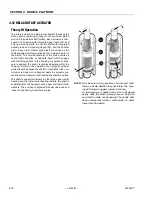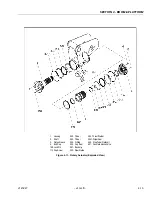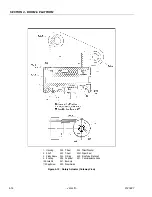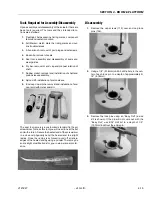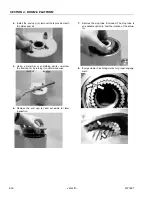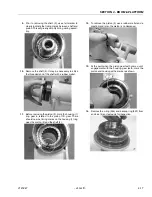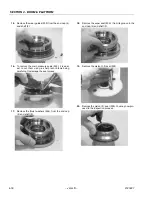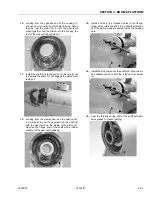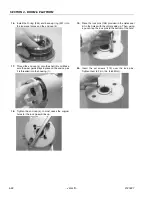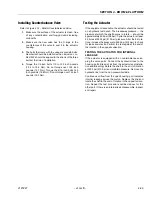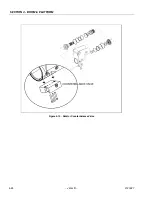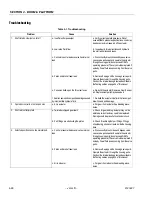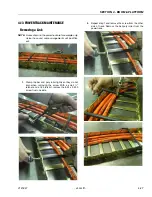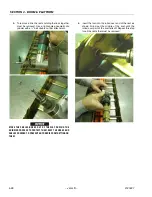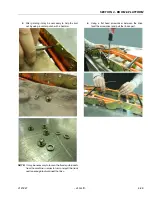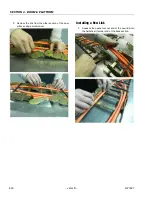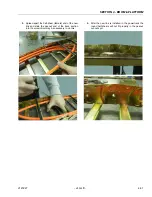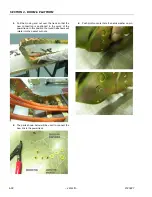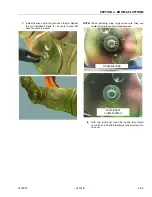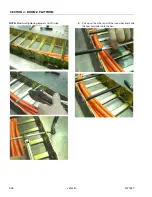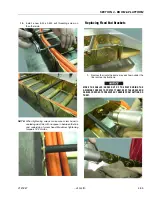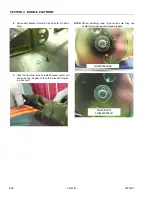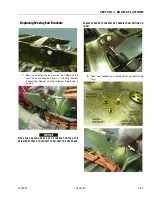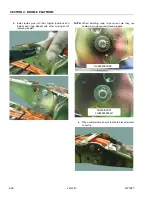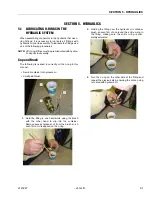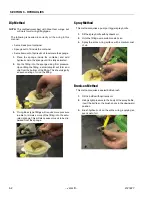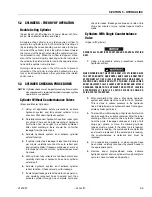
SECTION 4 - BOOM & PLATFORM
4-26
– JLG Lift –
3121827
Troubleshooting
Table 4-1. Troubleshooting
Problem
Cause
Solution
1. Shaft rotates slowly or not at all
a. Insufficient torque output
b. Low rate of fluid flow
c. Control or counterbalance valve has internal
leak
d. Piston and/or shaft seal leak
e. Corrosion build-up on the thrust surfaces
f. Swollen seals and composite bearings caused
by incompatible hydraulic fluid
a. Verify correct operating pressure. Do not
exceed OEM’s pressure specifications. Load may
be above maximum capacity of the actuator.
b. Inspect ports for obstructions and hydraulic
lines for restrictions and leaks.
c. Disconnect hydraulic lines and bypass valve.
Leave valve ports open and operate the actuator
through housing ports (do not exceed OEM’s
operating pressure). The valve must be replaced if
a steady flow of fluid is seen coming from the valve
ports.
d. Remove the plug and the housing’s valve ports.
Operate the actuator through the housing ports.
Conduct the internal leakage test as described in
the Testing section on page 24 of this manual.
e. Re-build the actuator. Remove all rust then pol-
ish. Replacement parts may be needed.
f. Re-build the actuator. Use fluid that is compati-
ble with seals and bearings.
2. Operation is erratic or not responsive
a. Air in actuator
a. Purge air from actuator. See bleeding proce-
dures.
3. Shaft will not fully rotate
a. Twisted or chipped gear teeth
b. Port fittings are obstructing the piston
a. Check for gear binding. Actuator may not be
able to be re-built and may need to be replaced.
Damage could be a result of overload or shock.
b. Check thread length of port fittings. Fittings
should during stroke not reach inside the housing
bore.
4. Selected position cannot be maintained
a. Control or counterbalance valve has internal
leak
b. Piston and/or shaft seal leak
c. Air in actuator
a. Disconnect hydraulic lines and bypass valve.
Leave valve ports open and operate the actuator
through housing ports (do not exceed OEM’s
operating pressure). The valve must be replaced if
a steady flow of fluid is seen coming from the valve
ports.
b. Remove the plug and the housing’s valve ports.
Operate the actuator through the housing ports.
Conduct the internal leakage test as described in
the Testing section on page 24 of this manual.
c. Purge air from actuator. See bleeding proce-
dures
Summary of Contents for JLG E400AJP
Page 2: ......
Page 32: ...SECTION 1 SPECIFICATIONS 1 18 JLG Lift 3121827 NOTES...
Page 42: ...SECTION 2 GENERAL 2 10 JLG Lift 3121827 NOTES...
Page 54: ...SECTION 3 CHASSIS TURNTABLE 3 12 JLG Lift 3121827 Figure 3 3 Speed Sensor Orientation...
Page 60: ...SECTION 3 CHASSIS TURNTABLE 3 18 JLG Lift 3121827 Figure 3 7 Steering Components and Spindles...
Page 62: ...SECTION 3 CHASSIS TURNTABLE 3 20 JLG Lift 3121827 Figure 3 9 Tilt Sensor Location...
Page 86: ...SECTION 3 CHASSIS TURNTABLE 3 44 JLG Lift 3121827 Figure 3 16 Swing Components...
Page 88: ...SECTION 3 CHASSIS TURNTABLE 3 46 JLG Lift 3121827 Figure 3 18 Battery Cable Connections...
Page 90: ...SECTION 3 CHASSIS TURNTABLE 3 48 JLG Lift 3121827 Figure 3 20 On Board Generator...
Page 97: ...SECTION 3 CHASSIS TURNTABLE 3121827 JLG Lift 3 55 Figure 3 22 Generator Components...
Page 116: ...SECTION 3 CHASSIS TURNTABLE 3 74 JLG Lift 3121827 NOTES...
Page 127: ...SECTION 4 BOOM PLATFORM 3121827 JLG Lift 4 11 Figure 4 10 Boom Limit Switches...
Page 140: ...SECTION 4 BOOM PLATFORM 4 24 JLG Lift 3121827 Figure 4 13 Rotator Counterbalance Valve...
Page 178: ...SECTION 5 HYDRAULICS 5 24 JLG Lift 3121827 Figure 5 26 HydraForce Cartridge Torque Value Chart...
Page 214: ...SECTION 6 JLG CONTROL SYSTEM 6 34 JLG Lift 3121827 NOTES...
Page 257: ......

